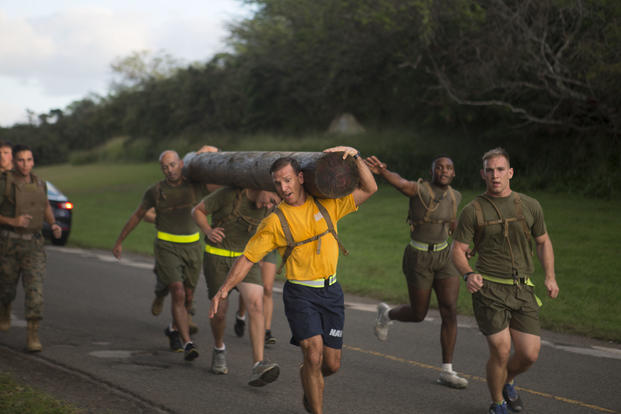The grueling nature of SEAL training -- or any military training, for that matter -- ingrains teamwork. No one makes it through training by themselves. You are always paired up with a "swim buddy," a "battle buddy" or partner, and you are always part of a boat crew or squad. Finally, you are part of a BUD/S class that typically starts out with 120-150+ students and graduates (six months later) an average of about 25-40.
Those graduates are not necessarily the biggest, fastest or strongest, but they are the ones with the highest mental toughness and are able to mesh into the team dynamics needed to succeed each day. Sure, fitness is critical to success, and the fitter you are, the less you have to rely on mental toughness. This combination of traits can help you focus on being a good team player and a superb communicator who supports classmates with any task.
Putting everyone in a military team through the same training allows them to look at each other and know by body language what they're saying and thinking. They're able to communicate without speaking or writing. You cannot be an effective team member without stellar verbal and non-verbal communication. Effective team communication is not just about transmitting well, but having the necessary attention to detail to receive signs that are often very subtle.
What makes SEALs good communicators on land is the fact that they communicate underwater as well, sometimes at night, using hand and arm squeezes. They take non-verbal communication to another level.
Seriously. From body language and hand signals, you can convey and receive information, such as the direction to travel to a target, the number of contacts, or if someone is injured or out of air and needs help. Your awareness peaks to a high level when you successfully communicate under stressful conditions.
The end result of military training is the ultimate teammate who is flexible with timetables and adjusts to get the job done, no matter what logistical issues arise. Members of teams are still individuals who thrive on competition and hate to be beaten in anything, but that competition makes the team better.
Being a competitor helps you through the tough times. Thinking about winning instead of merely surviving helps the team and the individual compete on a new level when the stakes are high. So, yes, your individual fitness one day may save your or your teammate's life and help you push yourself and others harder when needed.
Being a well-oiled machine with regard to teamwork and communication allows you to be flexible and adapt to any situation. Personal attention to detail enables strong communication (sending and receiving) throughout the team, and this can take contingency planning to a new level. Effective communications through detailed planning enables the team to anticipate when things go wrong and still be able execute flawlessly. None of these is possible by being a bad team player, and you cannot be a good team without communication skills.
Breathing and External Awareness
The best advice I ever received and still use today, especially when under time constraints, is to breathe. Not just any old breath. The goal is to take a big, deep breath (big inhale and long exhale), step back, increase your attention to detail to see the big picture, focus on what you need to do and execute.
By breathing, you increase external awareness, and this will help you be aware of your surroundings and the people in it. Notice the crowd around you, detach from the phone, make eye contact with co-workers and notice body language, as mentioned above. It is easy to see when someone needs help if you pay attention to the team.
When on a team at work, in sports or in the military, your plan nearly always goes wrong right from the start nine times out of 10. This never fails. Contingency planning requires smart planning, attention to detail and communication.
A team has to be flexible with changes. Just because things do not go as planned does not mean you have to go off course. Keep moving with a well-communicated contingency plan. A good team can make a plan and execute it. A great team can have things go wrong and still continue the mission with a contingency plan.
Any team, whether in sports, business, military or other public service, needs all of these skills to handle the complex and ever-changing nature of stressful situations. One minute is different from the previous minute, and this requires constant communication and teamwork, and that will produce the Dream Team.
This is why when teenagers ask me what they can do to prepare for the military, I always say become a better team player -- play sports, join a band, school play, student government and whatever else gets you and others thinking and moving as one.
Stew Smith is a former Navy SEAL and fitness author certified as a Strength and Conditioning Specialist (CSCS) with the National Strength and Conditioning Association. Visit his Fitness eBook store if you're looking to start a workout program to create a healthy lifestyle. Send your fitness questions to stew@stewsmith.com.
Want to Learn More About Military Life?
Whether you're thinking of joining the military, looking for fitness and basic training tips, or keeping up with military life and benefits, Military.com has you covered. Subscribe to Military.com to have military news, updates and resources delivered directly to your inbox.




















